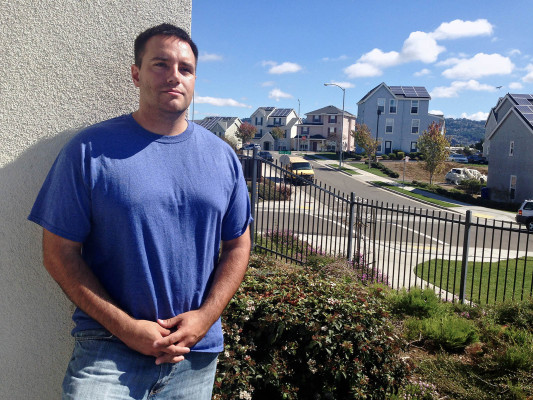| |
A cop, and a resident, of Richmond Village

Richmond Police Officer Benjamin Therriault stands outside of his apartment in Richmond Village. (Photo by Shawn Baldwin)
By Shawn BaldwinPosted 1 hour ago
It was after 2 a.m. when Benjamin Therriault woke to ear-splitting music blaring outside his south Richmond apartment.
He threw on a hoodie and jeans and strode outside, then toward a gaggle of young men smoking pot by a car. Neighbors peeked from their doorways.
He identified himself as a cop, had a brief verbal exchange, then watched as the men fled in the car.
“You need to beat it,” Officer Therriault recalled telling the group. “That was the nice version.”
Disturbance quelled, Therriault and his neighbors resumed their slumber. No public resources required.
“That’s a call that might take 10-15 minutes, maybe an hour, for a (police) car to show up,” he said.
After several similar encounters, news spread that a police officer lived in the neighborhood.
Therriault, a 32-year-old bachelor who hails from Montana, moved into one of Richmond’s toughest neighborhoods three years ago as part of the city’s “Police-in-Properties” program. He lives in a one-bedroom apartment in Richmond Village, a low-income housing project that a few years ago was one of the city’s most violent.
“It was a place that usually two officers would go into. There was rampant drug dealing, rampant shootings — it was a very, very, dangerous place,” Therriault said.
The program is run by the Richmond Housing Authority. It allows a police officer to live rent-free in one of the six communities run by the Housing Authority.
Giulia Colbacchini, who works at the Richmond Housing Authority properties, said the goal of “Police-in-Properties” is to “discourage, diminish and decrease the level of criminal activity” in the public complexes.
Although several officers have taken part in recent years, only Therriault remains in the program. The only cost to the city is the free rent, which is partially subsidized by the federal HUD program.
Formerly known as Easter Hill, the Richmond Village was renovated in 2004 and placed under new management. The neighborhood now has more than 60 townhouse-style buildings with more than 200 apartments, a fitness center and a swimming pool.
It also has a cop for a resident, an extremely rare feature in a public housing community.
“The fear of crime, since I’ve lived there, has diminished greatly,” Therriault said, citing several factors including programs implemented by the Police Department as well as a change in the property’s management.
Despite several high-profile shootings this month, violent crime in the city has plunged.
According to department statistics released last month, overall violent crime is down more than 20 percent compared to this time last year.
Many city officials and police officers attribute the crime drop to community policing policies implemented by Police Chief Chris Magnus, who also lives in Richmond, as do a handful of other officers.
While the numbers are small, having officers live in the city has an effect.
“The old police model is that cops drive around in patrol cars and they rush from one reported crime to another reported crime and they never really establish a relationship with the community,” Richmond City Councilman Tom Butt said. “In a community like Richmond, relationships are everything. Preventing and solving crime is as much a community job as it is a police job.”
Therriault grew up on the Flathead Indian Reservation, where his father was a tribal chairman. He enlisted in the Air Force after finishing high school. He was later deployed to Iraq as a military police officer.
He’s no stranger to working and living in challenging environments.
In 2005, his unit was attached to the U.S. Army’s 18th Military Police Brigade at Camp Bucca, one of the largest U.S. military detention centers in southern Iraq, housing up to 7,000 Iraqi detainees.
Therriault worked as part of a 20-man team that responded to riots inside of the prison, battling detainees who would “throw rocks and rebar,” he said.
Therriault’s unit was also assigned to recapture escaped prisoners and provide security on convoys picking up detainees at the notorious Abu Ghraib prison outside of Baghdad.
He sees the experience living in south Richmond as a “personal social experiment.” The arrangement drew some attention among his colleagues.
“A lot of coworkers thought I was crazy,” he said.
Crazy or not, the Richmond Village has benefitted from Therriault’s presence, and the city’s community policing in general.
Tyrone Payne, the property manager at Richmond Village, describes Therriault as his liaison with the police in dealing with issues including loitering, burglary, and vandalism. Payne said having a local cop living there helps break down community stereotypes about police.
“He can literally be on his porch, see somebody and have a conversation, as opposed to someone thinking, ‘Oh, he’s in uniform coming to get me,’” Payne said.
Beatrice White, a Richmond Village resident for eight years, said she feels good about having a cop for a neighbor.
“If he needs me for anything, I’m there for him because I know he’s there for me and my family,” White said.
|
|

